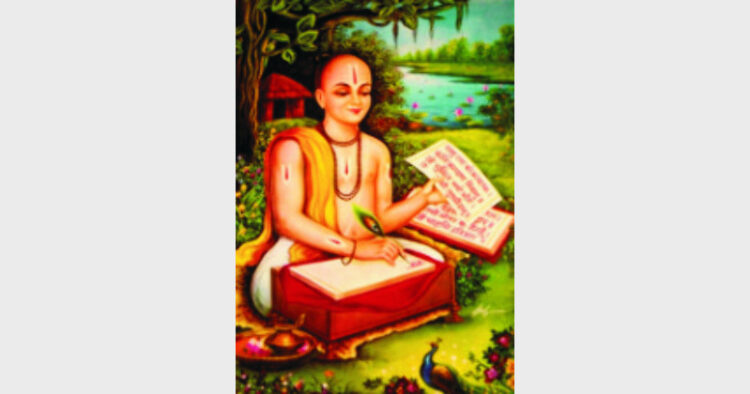Anoop Verma
In Hindu history Goswami Tulsidas, the author of Ramcharitmanas, is regarded as a reincarnation of Valmiki. It is stated in the Bhavishyottar Purana that Lord Shiva had once revealed to Parvati that Valmiki had a boon from Hanuman for being reincarnated on earth during the Kali Yuga. Shiva states that after being reincarnated, Valmiki would sing glories of Sri Ram in vernacular language. It is traditionally believed that this prophecy of Lord Shiva came true in the year 1532 when Valmiki got reincarnated as Goswami Tulsidas.
Goswami Tulsidas was born in a Brahmin family; his father’s name was Atmaram Shukla Dube and mother’s name was Hulsi. According to some legends, he had a full complement of teeth at the time of his birth, and instead of crying, he uttered the name of Sri Ram, which is why his parents decided to name him Rambola. Due to reasons that are not quite clear, while Tulsidas was still a child, Narharidas, a wandering sadhu, adopted him. The foster parent played a key role in nudging Tulsidas towards the path of devotion to Sri Ram. Tulsidas mentions in Ramcharitmanas about how his foster father took pains in relating the story of Sri Ram to him. Narharidas was also instrumental in changing the boy’s name from Rambola to Tulsidas.
Some accounts suggest that Tulsidas got married to Ratnavali. The couple lived at Rajapur. Being extremely devoted to his wife, Tulsidas could not bear any separation from her. On one occasion, when his wife had departed for her paternal home, Tulsidas’s infatuation forced him to cross the Yamuna so that he could spend the night with her. But the account of Tulsidas’s infatuation with his wife comes to us from Priyadas, who wrote his commentary almost a century after Tulsidas’s death. Priyadas’s account is not considered to be historically accurate by many scholars.
Tulsidas soon left his family to immerse himself in prayers. It is said that he obtained a vision of Sri Ram through the interventions of Hanuman. After being told by Hanuman that Sri Ram would give him a darshan in the forest of Chitrakoot, Tulsidas visited that holy town, where he used to spend much of his time in praying. One day while he was doing a parikrama of the hill in Chitrakoot, where Sri Ram is said to have stayed, he saw two handsome princes, one dark complexioned and the other fair complexioned, riding beautiful horses. The beauty of the two princes mesmerised him, but he failed to realise that he was seeing Sri Ram and Lakshman. Later on when he learned about their identity from Hanuman, he was saddened by his failure to recognise the God.
Many miracles have also been attributed to Tulsidas. On one occasion he raised a dead man to life. His miracles made him so famous that he was summoned to the court in Delhi and was ordered by the emperor to conjure a miracle. Tulsidas refused to oblige, preferring to chant the holy name of Sri Ram. This infuriated the emperor, who had Tulsidas arrested and locked up in a cell. Tulsidas appealed to Hanuman, who dispatched a large number of monkeys who created a great havoc in the emperor’s court. Ultimately the emperor had to let Tulsidas go.
According to a popular legend, one night when Tulsidas was engaged in meditation in his hut in Kashi, Lord Shiva manifested himself and inspired him to write Sri Ram Katha in vernacular language. In his Ramcharitmanas Tulsidas makes a brief allusion to the inspiration that he got from Lord Shiva. It is also stated in the scripture that work on it had started in the month of Chaitra, which is the birth month of Sri Ram. It is believed that Tulsidas began working on the scripture in Vikram Samvat 1631 (year 1574). A large portion of the poem was composed at Varanasi, where the poet spent most of his later life. Ramcharitmanas means ‘The lake of deeds of Sri Ram’. Tulsidas thought that the story of Sri Ram was as purifying as taking a dip in the holy waters of Lake Mansarovar.
Tulsidas identifies Sri Ram with Vishnu, one of the three Gods of devotion, and also with the Supreme Spirit. God, to him, was not a passionless being, he saw Him as an entity that is capable of heeding to men’s prayers. The everlasting popularity the Ramcharitmanas enjoys is also due to Tulsidas’s masterful use of poetic imagery. The seven parts in Ramcharitmanas are Bal Kand, Ayodhya Kand, Aranya Kand, Kishkindha Kand, Sunder Kand, Lanka Kand and the Uttar Kand. By retelling Ramayana in the popular language of his own day, Tulsidas rejuvenated the Hindu faith. Ramcharitmanas has served as an inspiration for many social and bhakti movements. The popularity of the Ramcharit-manas has inspired the tradition of celebrating Ramlila, during which we have a dramatic enactment of the text.














Comments